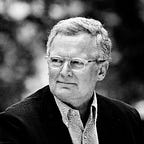It is only a few network connections away
We often create things together that nobody wants to create.
I was taking part in a training course on the management during an extreme national emergency. As a part of the program, we went through an exercise that simulated a deep global crisis with severe implications for the governance of a country. Although the gravity of the situation as it was expressed in the daily briefings was beyond anything we really experience, or can think of, all aspects of the apocalyptic views presented are actually a reality somewhere in the world at this very moment. This led me to reflect on my learning.
The experience brought by the Internet is that all people on our planet are only a few network connections, or handshakes, away from each other. The claim is that even when two people don’t know each other or do not have a friend in common, only a short chain of intermediaries separates them. Stanley Milgram performed his first famous experiments even before the era of the mobile phone, the Web and Facebook. His results indicated a median chain length of less than six (degrees of separation). The research was groundbreaking in suggesting that the whole global human society is a connected network characterized by extremely short path lengths. If the median was just below six in 1967, it is safe to assume that the researchers who claim that the same number today is below four, or even lower, may be right.
The dominant ways of thinking about the world have their origins in the Newtonian principles in which the universe was the sum of independent parts. Interdependence and the emergent results from this complex interdependence played a minor role. The populist thinking still follows the logic that we can choose not to be interdependent. We can build walls and opt out.
This is not possible because what really happens arises in the complex interplay of all the network actors with all their intentions, which is why leaders cannot choose outcomes although they can choose their next action.
We often create things together that nobody wants to create.
Nothing ever happens in an independent way. Interdependent individuals relate to each other in a responsive manner, with a gesture from one party calling forth a response from another. George Herbert Mead was the first social psychologist to take the stance that meaning arises in the responsive interaction between gesture and response. The important implication is that meaning does not then arise independently in each actor first to be then subsequently expressed in action. Actions are not independent. Meaning is not attached to any single act but is perpetually created in interaction. Cognition is relational. Our perception of the world is then confined to groups of acquaintances. Sometimes this is good news, sometimes very bad.
The old ways of understanding human behavior are not up to the task any more. In contrast to Newtonian traditions, the science of social networks offers an entirely new way of understanding the interdependent human society.
Let’s imagine your house is on fire. Luckily there is a lake nearby. But you are alone. You run back and forth but without some help you may not be able to carry water fast enough. Let’s then suppose that you are not alone, and people around you want to help. If you have seen old movies where this happens, a peculiar form of organization emerges. People form a line from the lake to the house passing full buckets of water towards the house and empty buckets back towards the lake. What is happening is called a “bucket brigade”. It is not about the individuals or the community, but about a particular form of emergent organizing that at the same time distributes the task at hand and integrates the efforts of the people in a coordinated way. If we take the idea of the bucket brigade and connect it with the notion of the small world network, we have a global concept of participation.
A better understanding of social networks is essential for facing the new threats in the world. They are only a few handshakes away, whether we want it or not. Global social unrest is only a few network connections away from all of us.
This better understanding of interdependence also leads to the necessity for empathy and participation. We cannot ignore or opt out. It is not possible. We need to take part in the bucket brigades, and not only when our own house is on fire. Quoting Hannah Arendt:
“No more is required, and no more can reasonably be asked, for this planet to remain a place fit for human habitation”
.
Credits: Duncan Watts, Steven Strogatz, Stanley Milgram, Ralph Stacey, Kim Mattsson and Mika Kalliomaa
